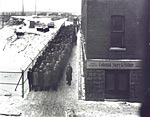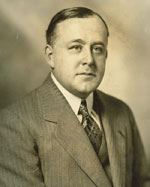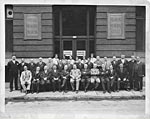

The Great Depression
Camillien Houde was re-elected mayor in 1930 during the Great Depression. The unemployed marched through city hall by the hundreds in search of employment. Houde distributed food and clothing to needy families.
But the economic slump shook the confidence of electors in the municipal government. In 1932, several scandals erupted over the fact that the secretaries of municipal councillors, mostly Houde followers, were responsible for providing direct aid to unemployed workers.
In 1932, Fernand Rinfret campaigned vigorously over that issue and defeated Houde. Despite his willingness to reform the city’s financial management system, the situation did not improve. Camillien Houde was re-elected in 1934, defeated in 1936, then re-elected in 1938, but proved unequal to the challenge.
In 1933, roughly 30% of the population required some type of aid. The municipality’s sources of revenue were clearly insufficient, and numerous loans had to be secured. As was the case for other cities, Montréal assumed the cost of existing social services, without having the necessary financial resources to do so. The interventions of upper-tier governments in that area were few and far between.
The economic slump thus marked the imbalance between the major problems facing the municipality and the limited means at its disposal to solve them. Montréal financial circles saw things differently. In their view, it was a clear case of inadequate management and outright corruption at city hall.
































